EU Sport Forum 2023
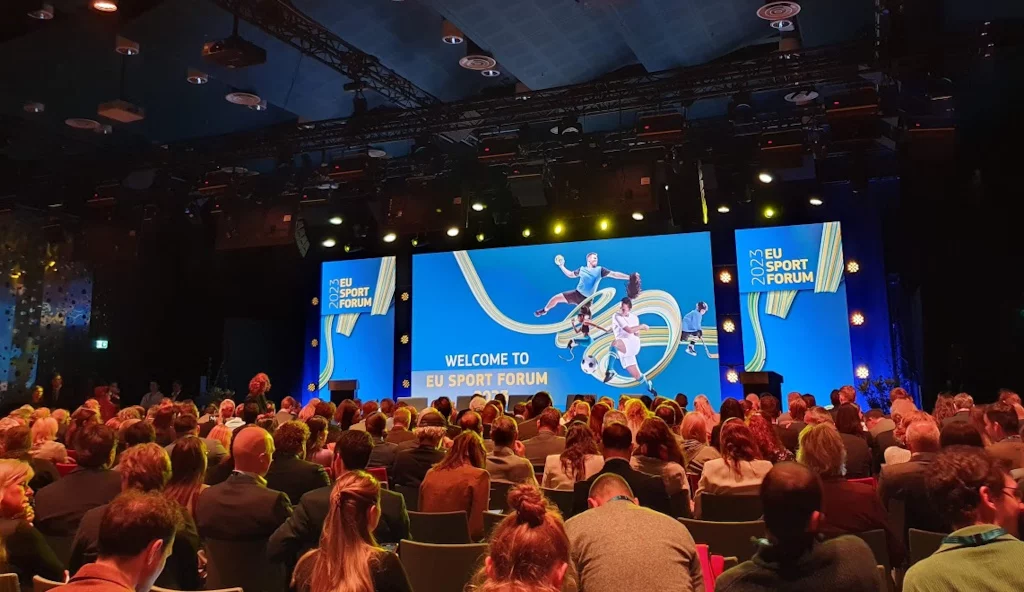
The European Commission and the Swedish Presidency of the Council of the European Union prepared the traditional EU Sport Forum – the largest sports stakeholders event in Europe – being hosted in the Swedish capital on May 2 and 3, 2023. Several key organisations and bodies were present in Stockholm, including representatives of the European University Sports Association (EUSA) and its Institute.
The event started with the welcome speeches and addresses. The participants were addressed first via video address by Mariya Gabriel, EU Commissioner for Innovation, Research, Culture, Education and Youth; followed by Jakob Forssmed, Minister for Social Affairs and Health, representing the Swedish Presidency; and Tomasz Frankowski, Member of the European Parliament and Co-chair of European Parliament Sport group. Main moderator of the event was Paulina Modlitba, well-known Swedish entrepreneur and member of the board of UN Women Sweden.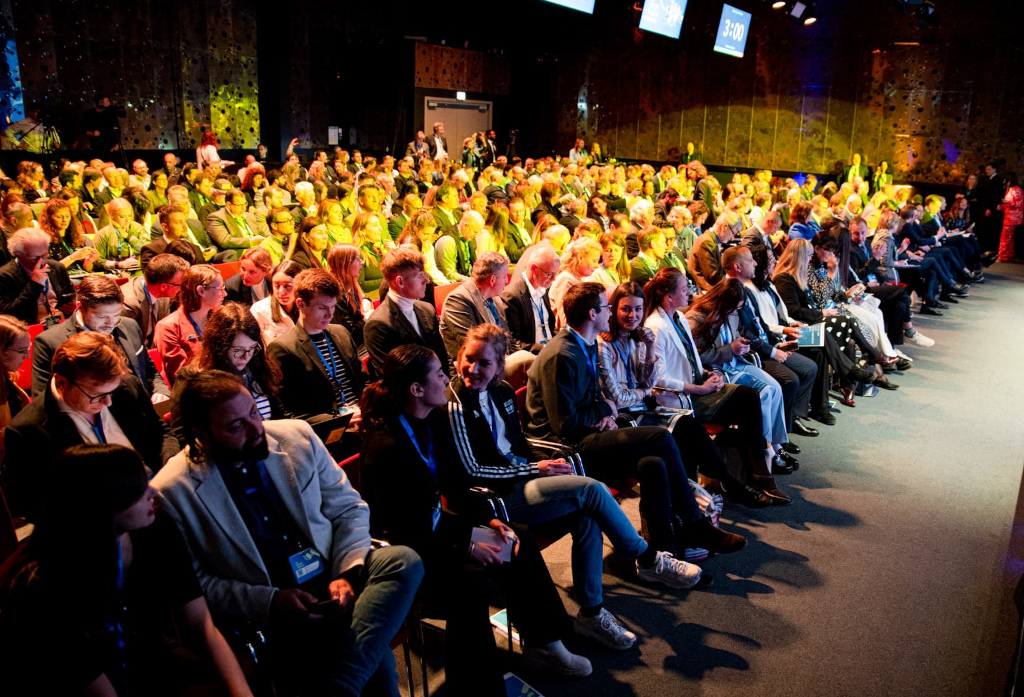
Following the initial welcomes, the first keynote speeches were made on one of the European flagship sports event UEFA Euro 2024 by Philipp Lahm, Tournament Director and Célia Šašić, Event Ambassador. They highlighted the plans of having the event as celebration of European community of values, including sustainability, smarter planning and inclusion of cultural, social and other content alongside the sports event.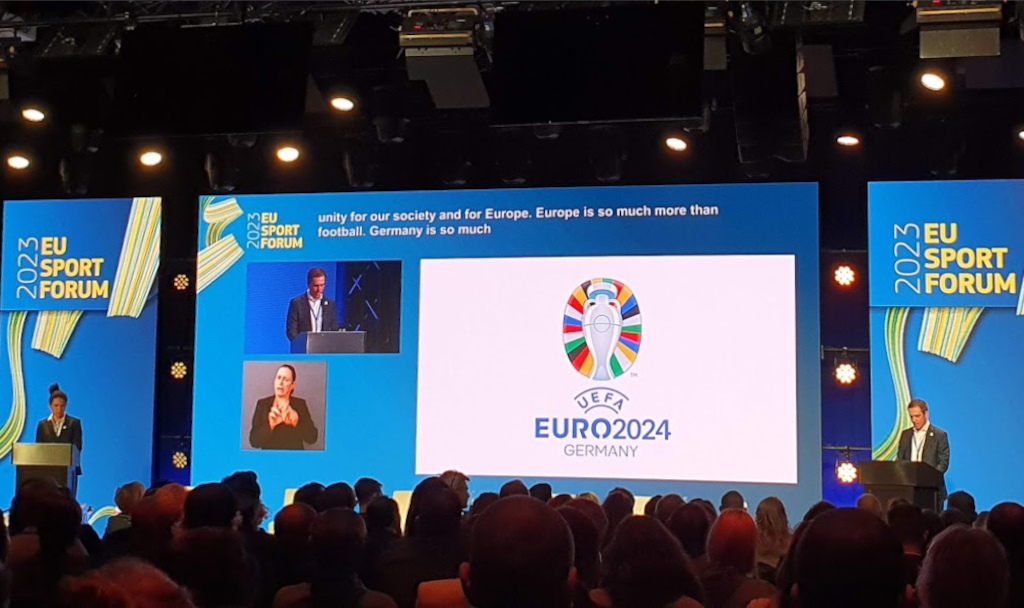
High-level panel discussion focused on Women in sport: from grassroots to leadership. Speakers were Viviane Hoffmann, Deputy Director-General for Education, Youth, Sport and Culture (DG EAC) of the European Commission; Bjørn Berge, Deputy Secretary General of the Council of Europe; Sarah Keane, President of the Olympic Federation of Ireland and former member of the High-Level Group on Gender Equality in Sport; Stefan Bergh, Secretary-General of the Swedish Sport Confederation and President of the European Non-Governmental Sport Organization (ENGSO); Barbara Fuertes, Representative of the Spanish Presidency, Director of the Women and Sports Directorate, Spanish High Council for Sports. Several strategies on European, national and organisational levels, as well as good practice initiatives were presented and discussed. 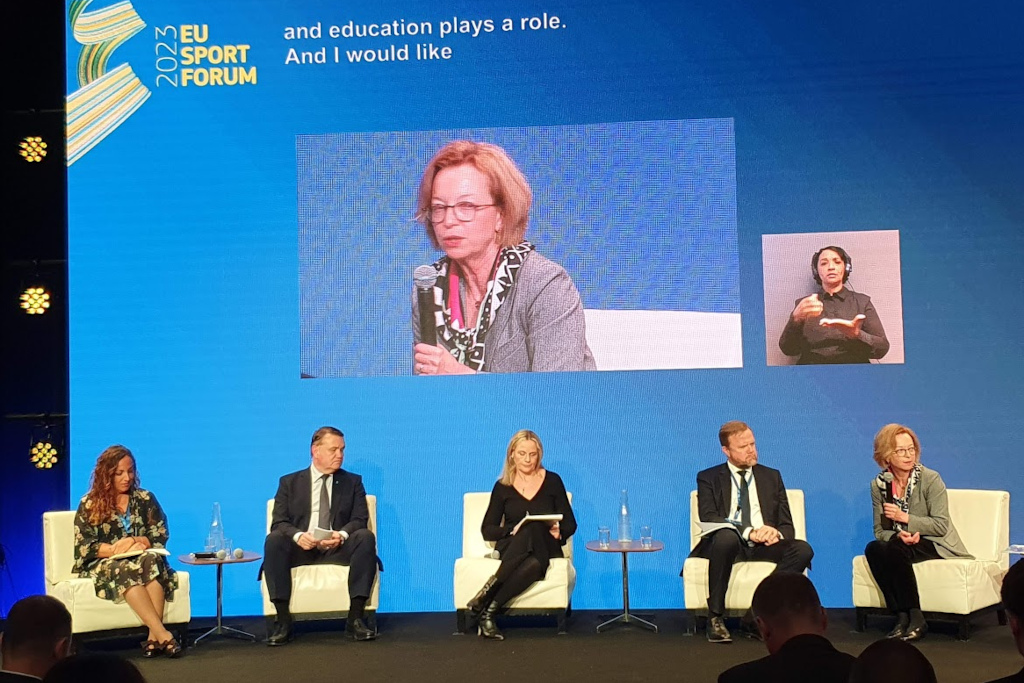
One of the highlights of the first day was the #BeInclusive EU Sport Awards ceremony. Almost 100 amazing projects and individuals were part of the competition launched in 2022. The finalists in three award categories attended the event, and the award recipients for this year were announced in a solemn ceremony. The Breaking barriers in sport award, showing inspiration, giving positive examples of empowerment and role models from groups with fewer opportunities, was presented to the Free Movement Skateboarding, Greece for their initiative Free Movement Skateboarding for the well-being, empowerment and social cohesion for Athenian youth through skateboarding. The award on promoting gender equality in sport “Be Equal” on projects promoting the empowerment and participation of women and girls in sport was presented to Kayak Club Zlatorog, Slovenia for their initiative PaddlePWR-GirlPWR (PPGP). The Sport for peace award, showcasing how sport can be used as a vehicle to promote peace and European values, was presented to Youth Line Portugal, Portugal for their initiative of sports as a tool for better integration of Ukrainian refugees in a new (temporary) home – community-building activities in Portugal.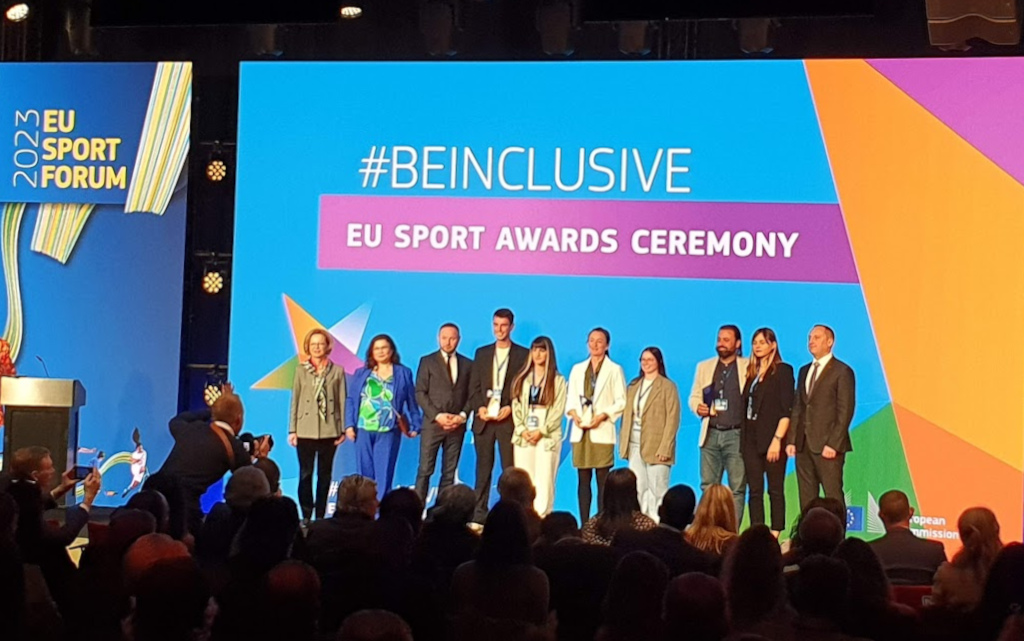
In the afternoon, the keynote speech was made by Catherine Chabaud, Member of the European Parliament, former journalist and sailor. She talked about her experiences, raising awareness of the importance of sustainability, preservation of the environment and specifically maritime issues and the protection of the ocean, presenting also the Ocean and Climate platform.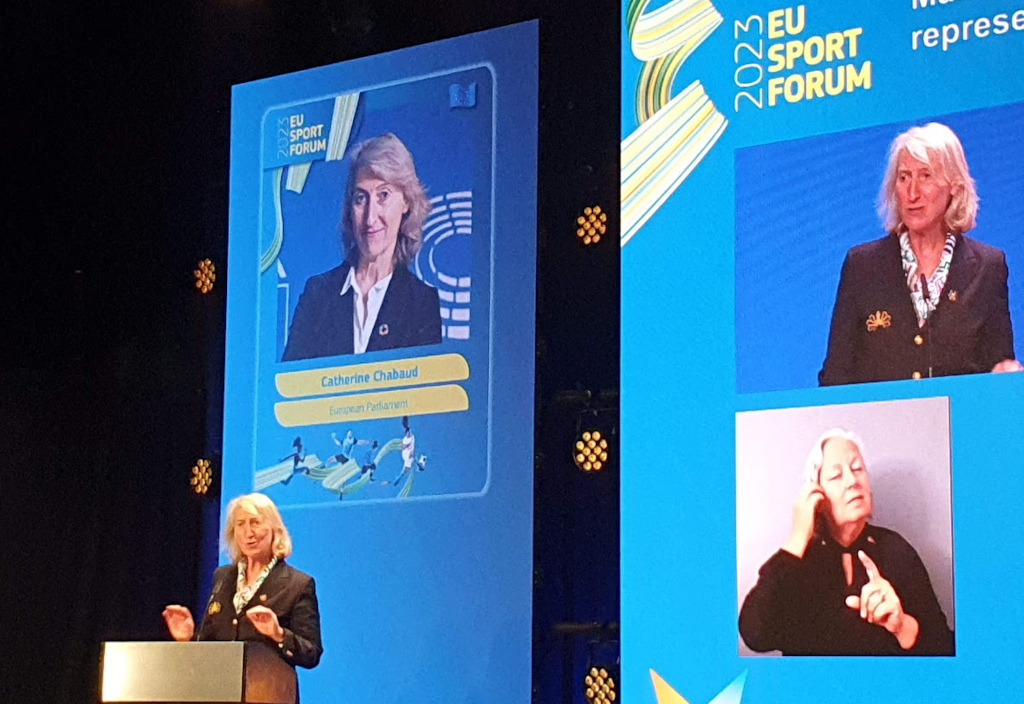
Good governance, fighting challenges in sport and promoting anti-doping, anti-corruption, anti-manipulation, anti-matchfixing, anti-harassment, anti-abuse – and integrity, transparency, ethics, safeguarding, accountability, consequences, prosecution as well as education, prevention, support and other actions were presented in the second panel discussion on Integrity in Sport by Olivier Niggli, Director General of the World Anti-Doping Agency (WADA); Paquerette Girard-Zappelli, Chief Ethics and Compliance Officer of the International Olympic Committee (IOC); Vincent Ven, Head of Anti Match Fixing of the Union of European Football Associations (UEFA); and Tine Vertommen, former member of High-Level Group on Gender Equality in Sport and Researcher at Thomas More University of Applied Sciences.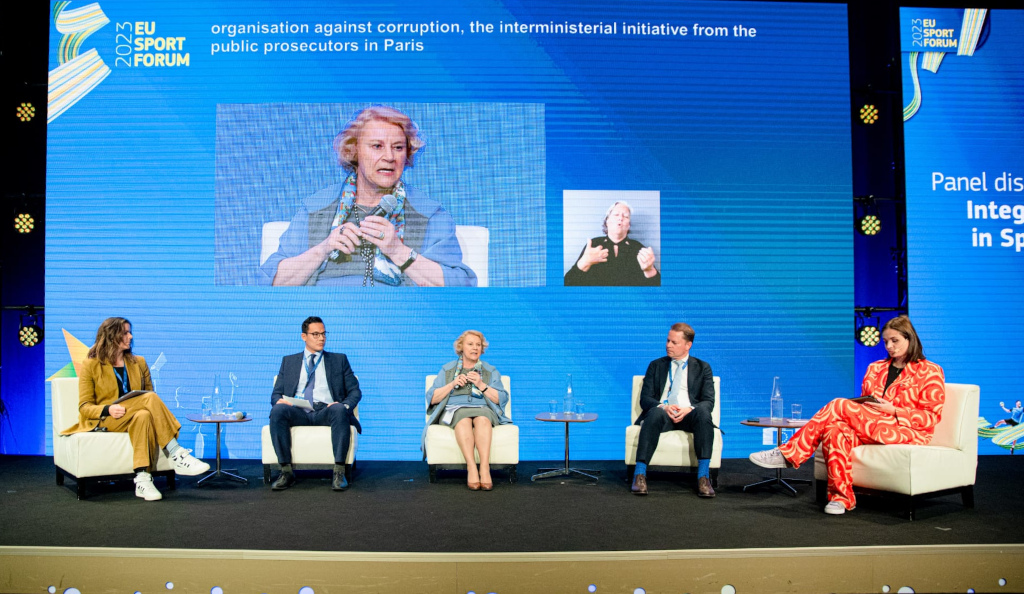
The afternoon programme of the first day offered two sets of parallel sessions. The first one focused on Physical Activity Policy for a Better Health. Contributions were given by Antti Blom, Programme Director at the National Agency for Education & LIKES Research Centre for Physical Activity and Health in Finland; Aurelie Van Hoye, Associate Professor at the University of Limerick in Ireland, and co-lead of the HEPA working group on sport clubs for health; Peter Gelius, Research Associate at the University of Erlangen-Nuremberg in Germany; and Tadhg McIntyre, Associate Professor at the Maynooth University in Ireland.
Second parallel session focused on Organising sustainable sport events in Europe. Annegret Korff, Head of Unit, Directorate-General Sports, German Ministry of the Interior and Community; Carmen Pérez González, Professor at University Carlos III Madrid in Spain; Hans von Uthmann, President of the Swedish Olympic Committee; and Mark Cutajar, Head of SportMalta.
The third parallel session of the day was on Sport skills, a lifelong competence. Claudia Bokel, former member of High-Level Group on Gender Equality in Sport and former Chair of the International Olympic Committee (IOC) Athletes’ Commission; Laurent Petrynka, President of the International School Sport Federation (ISF); Saga Fredriksson, Football player at Malmo FFM and Sergio Lara-Bercial, Vice President of the International Council for Coaching Excellence and Sport Coaching Europe.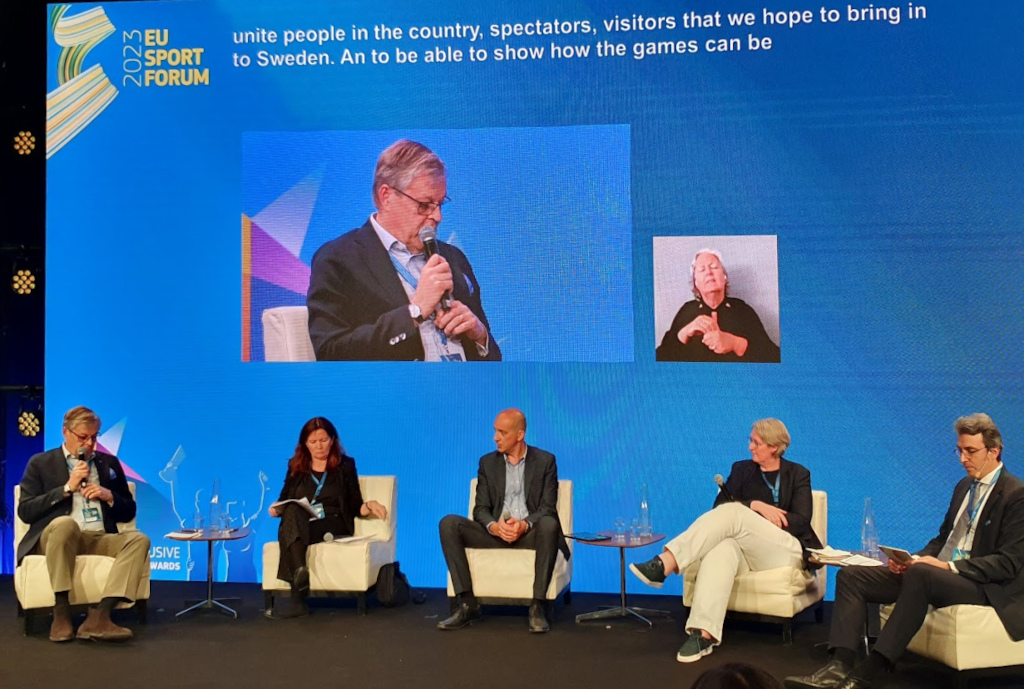
The second set of parallel sessions offered three topics. In the first session All able, all included: participation in sport and society, the panellists discussed the aspect of inclusion of people with disabilities. Martino Corazza, President of International Mixed Ability Sport; Asa Llinares Nordis, President of ParaSport Sweden and Vice-President of the European Paralympic Committee (EPC); Elias Mastoras, Winner of #BeActive Local Hero Award 2022, Chair of IBSA Blind Football and Founder of “A Ball for All”; Hayley Fitzgerald, Professor at Leeds Beckett University and Tomáš Fíbek, Senior Officer at the Czech National Sports Agency shed their perspectives and activities of their organisations and institutions.
The second parallel session SHARE initiative focused on European funding opportunities related to sport beyond Erasmus+. Floor van Houdt, Head of the Sport Unit of the European Commission; Arthur Le Gall, Director of KEA European Affairs; Marta Lazaro, Senior Consultant at KEA European Affairs; Benny Cullen, Director of Research and Innovation of Sport Ireland; and Dearbhla Jordan, Research and Evaluation Officer at Sport Ireland presented the additional opportunities and how they can be used and implemented in the sport context.
The last parallel session of the day was focused on the European Week of Sport and the #BeActive and #HealthyLifestyle4All campaigns, as interactive session with National Coordinating Bodies and official Partners of the European Week of Sport, lead by Ignacio Cocchiere, Violeta Birzniece and Peter Fischer, Policy Officers in the Sport Unit of the European Commission.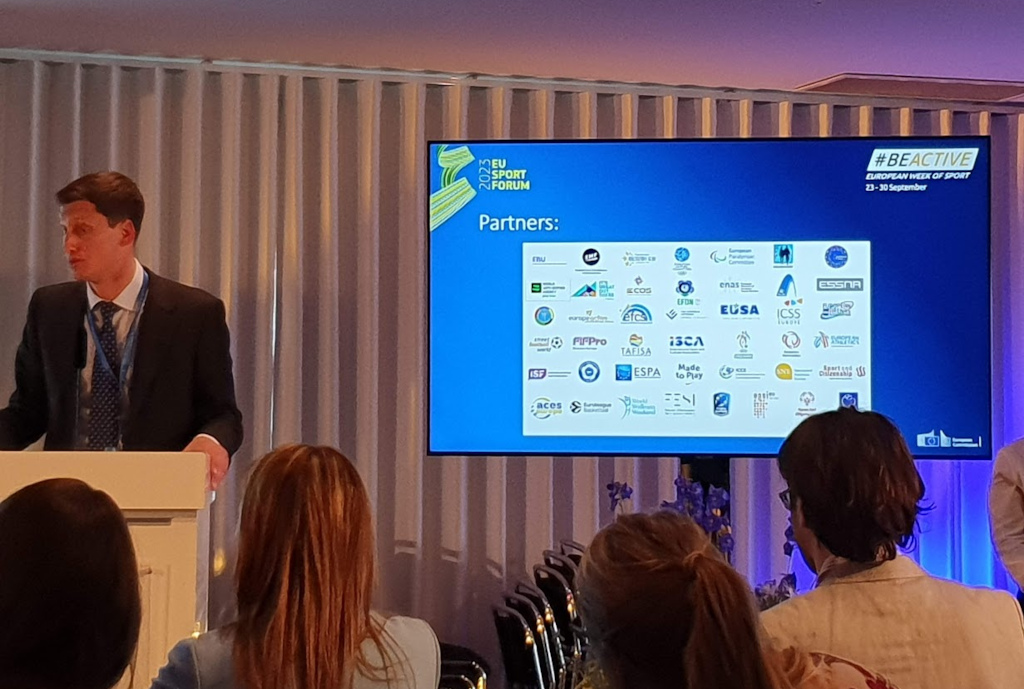
The second day started with Keynote Speeches by Maja Poljak from Croatia and Cédric Van Branteghem, from Belgium. Both speakers are former professional athletes, and are now engaged in their national Olympic Committees. They shared their dual career stories and experiences in sport.
Last set of parallel sessions offered two sets of topics. The first one focused on Good governance and athletes’ rights, with participation of Cédric Van Branteghem, Belgian Olympic and Interfederal Committee; Emma Terho, Chair of the IOC Athletes’ Commission; Giovanni Di Cola, Special Advisor on Field Operations and Partnerships at the International Labour Organisation; Irena Guidikova, Head of the Children’s Rights and Sport Values Department at the Council of Europe; and Paulina Tomczyk, Secretary General of EU Athletes.
The last parallel sessions was on Innovative youth voices in sport. Co-facilitated by Laura-Maria Tiidla from the International Sport & Culture Association ISCA) and Andrej Pisl from the European University Sports Association (EUSA), the session first gave an overview of the Healthy Lifestyle 4 All initiative and the work of the Youth Ideas Labs, presented by Violeta Birzniece from the Sport Unit of the European Commission, followed by the relevance and principles of youth engagement in sport. Delegates of Youth Ideas Labs then presented the work in four sessions; on the topics of Mental Health, Easy to Move, Digital Health and Healthy Solidarity. The 9 youth delegates taking part in the event and leading their sessions were nominated by 5 selected organisations, invited by the European Commission: Erasmus Student Network (ESN), ENGSO Youth, European Solidarity Network, European University Sports Association (EUSA) and Marie Curie Alumni: Ashish Avasthi, Federico Palumbo, Francisco Forte, Juliana Rocha, Marianna Pikul, Pedro Afonso Valente, Tabea Werner, Tiago Guilherme and Ugne Chmeliauskaite.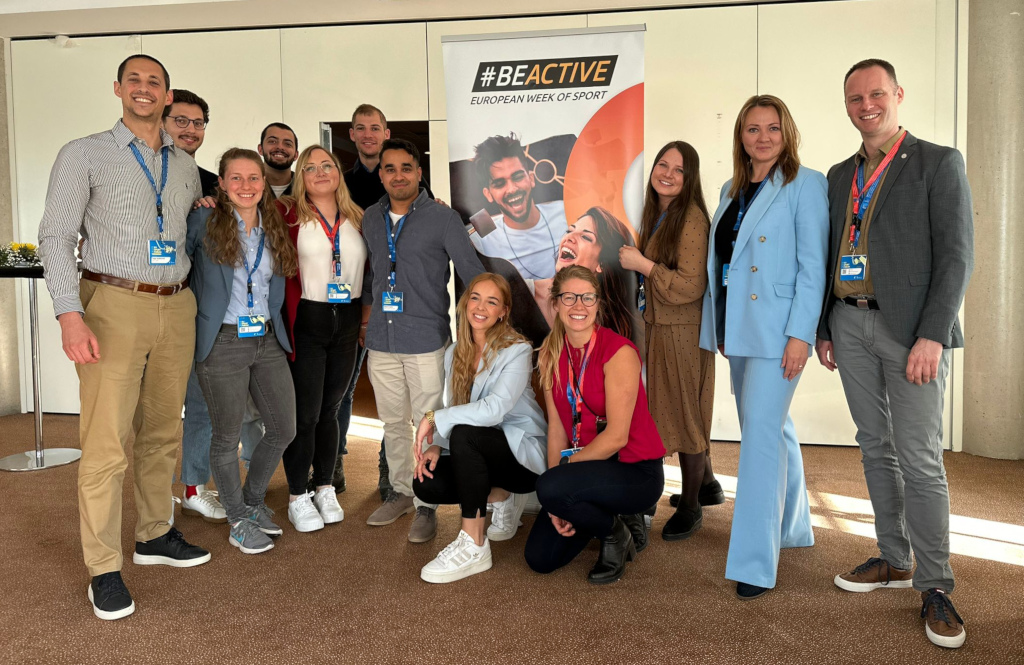
The event continued with a plenary session with the update on European Commission’s initiatives on sport & Erasmus+. Floor van Houdt, Head of the Sport Unit of the European Commission and Luciano Di Fonzo, Deputy Head of Unit for Erasmus Mundus and Sport of the Education, Audiovisual and Culture Executive Agency of the European Commission (EACEA) presented key information. They highlighted the main events, initiatives and funding opportunities. This year, a record number of applications were received within the Erasmus+ call for sport actions, and it is expected that over 350 projects will be funded in the amount of 58 million EUR from centralised actions, in addition to the decentralised actions in mobility in sport, which was a novelty this year.
The 2023 EU Sport Forum concluded with short reports of all parallel sessions over the 2-day event, and the closing remarks by Viviane Hoffmann, Deputy Director-General for Education, Youth, Sport and Culture (DG EAC) of the European Commission.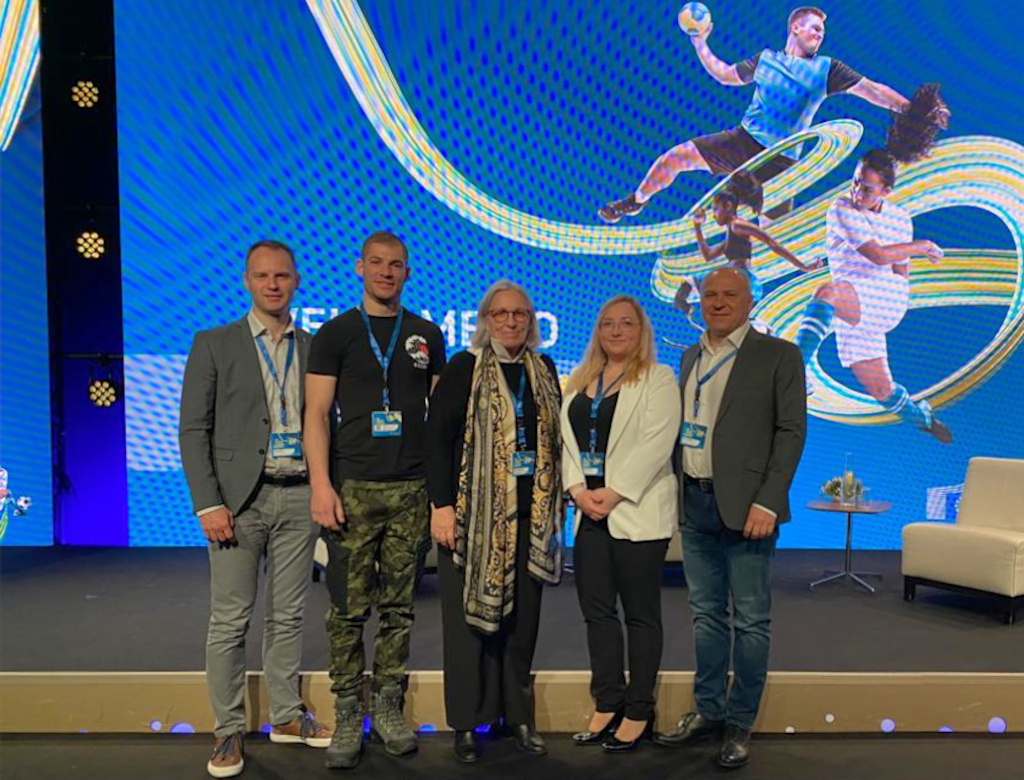
European University Sports Association (EUSA) and the EUSA Institute were represented at the event by its President Adam Roczek and Communications & Projects Manager Andrej Pisl. As participants of the Healthy Lifestyle 4 All Youth Labs Ideas nominated by EUSA, Marianna Pikul and Federico Palumbo took active part in the event as well, the latter in cooperation with the European Athlete as Student – Dual Career Network (EAS).
Apart of the important sessions, the EU Sport Forum offered opportunities of networking, meeting existing partners and developing opportunities for potential cooperation with new stakeholders. The hosts also prepared an unforgettable experience of having a special gala dinner, held in the historical ambience of the Vasa Museum.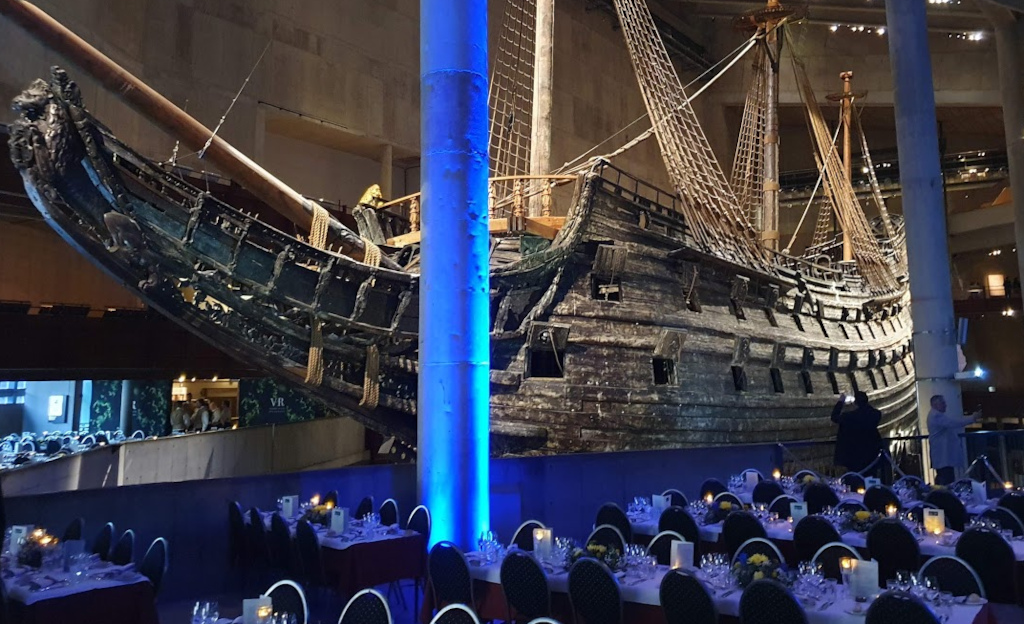
The EU Sport Forum was also streamed online. For more information and recordings, please see https://eusportforum2023.eu and https://sport.ec.europa.eu/initiatives/eu-sport-forum.
